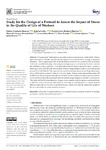Study for the design of a protocol to assess the impact of stress in the quality of life of workers

View/
Use this link to cite
http://hdl.handle.net/2183/27303
Except where otherwise noted, this item's license is described as Creative Commons Attribution 4.0 International License (CC-BY 4.0)
Collections
- Investigación (FCS) [1293]
Metadata
Show full item recordTitle
Study for the design of a protocol to assess the impact of stress in the quality of life of workersAuthor(s)
Date
2021-02-03Citation
Concheiro-Moscoso P, Groba B, Martínez-Martínez FJ, Miranda-Duro MDC, Nieto-Riveiro L, Pousada T, Queirós C, Pereira J. Study for the design of a protocol to assess the impact of stress in the quality of life of workers. Int J Environ Res Public Health. 2021 Feb 3;18(4):1413.
Abstract
[Abstract]
Background: Work stress is one of the most relevant issues in public health. It has a
significant impact on health, especially the development of mental disorders, causing occupational
imbalance. There is a growing interest in the development of tools with a positive effect on workers.
To this end, wearable technology is becoming increasingly popular, as it measures biometric variables
like heartbeat, activity, and sleep. This information may be used to assess the stress a person is
suffering, which could allow the development of stress coping strategies, both at a professional and
personal level. (2) Methods: This paper describes an observational, analytical, and longitudinal study
which will be set at a research center in A Coruña, Spain. Various scales and questionnaires will
be filled in by the participants throughout the study. For the statistical analysis, specific methods
will be used to evaluate the association between numerical and categorical variables. (3) Discussion:
This study will lay the foundation for a bigger, more complete study to assess occupational stress
in different work environments. This will allow us to begin to understand how occupational stress
influences daily life activity and occupational balance, which could directly enhance the quality of
life of workers if the necessary measures are taken.
Keywords
Work stress
Occupational balance
Occupational therapy
Burnout
Wearable technology
Participatory health
Xiaomi Mi Smart Band 3
Occupational balance
Occupational therapy
Burnout
Wearable technology
Participatory health
Xiaomi Mi Smart Band 3
Editor version
Rights
Creative Commons Attribution 4.0 International License (CC-BY 4.0)
ISSN
1661-7827






